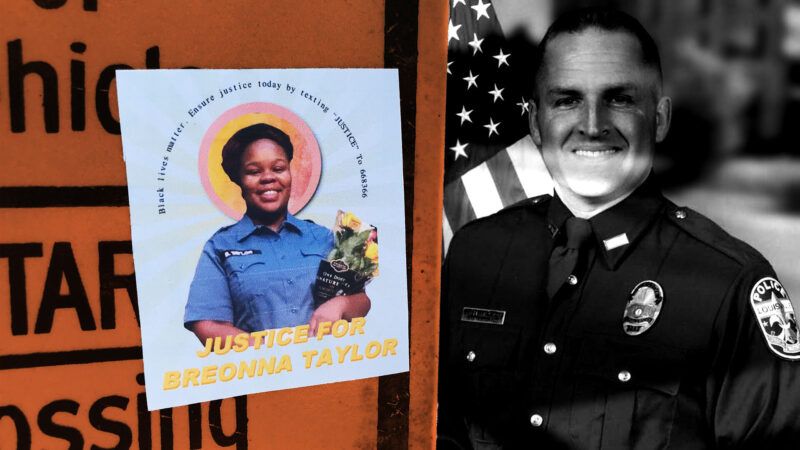5 Years After Breonna Taylor Was Killed, 1 Officer Gets 33 Months
Brett Hankison was convicted of violating Breonna Taylor’s Fourth Amendment rights during a fatal no-knock police raid.

It's been over five years since the tragic death of Breonna Taylor, who was fatally shot during a no-knock police raid at her home in Louisville, Kentucky. On Monday, Brett Hankison, a former Louisville Metro Police Department (LMPD) officer, was sentenced to 33 months in prison and three years of supervised release for unlawfully using deadly force and violating Taylor's Fourth Amendment rights. Hankison, who was convicted in November 2024 on one count of civil rights abuse in a United States District Court for the Western District of Kentucky, had faced up to a maximum sentence of life in prison.
"We got something," Taylor's mother, Tamika Palmer, told WLKY, a local CBS News affiliate, following the hearing. "I don't think it was a fair sentencing, but it was a start."
On the night of the fatal police raid in March 2020, LMPD officers arrived at Taylor's home to conduct a no-knock raid based on a misleading and legally deficient search warrant linking Taylor, a 26-year-old EMT, to drug dealing based on receiving packages for an ex-boyfriend.* Standing outside, Hankison blindly fired 10 rounds into Taylor's blinds- and curtain-covered window and sliding glass door.*
Although none of those shots killed Taylor, Hankison was fired three months after the raid for having "displayed an extreme indifference to the value of human life" and "wantonly and blindly" firing his gun, according to acting Police Chief Robert Schroeder. In September 2020, the former LMPD officer was indicted by a Kentucky grand jury on three felony counts for endangering Taylor's neighbors based on bullets found in her adjacent apartment. But Hankison was acquitted in March 2022, after the jury unanimously found that he did not act with "wanton endangerment," despite the clear evidence that he acted recklessly and without regard to whether his gunfire would injure or kill Taylor, her neighbors, or even his fellow officers. As Reason's Jacob Sullum wrote following the trial, "that decision vividly illustrates how difficult it is to hold police officers accountable for using excessive force even in the rare cases where they face criminal charges."
However, five months later, Hankison was charged again, this time in federal court for willfully violating the rights of Taylor, her boyfriend, and her three neighbors based on his reckless conduct during the raid. He received two federal trials, with the first resulting in a mistrial. The second jury ultimately convicted Hankison for willfully violating Taylor's Fourth Amendment rights, endangering her life by unlawfully using deadly force.
In both trials, Hankison testified that he fired his gun to aid fellow officers, whom he thought were under sustained fire. In reality, the gunfire he heard was that of his fellow officers, who shot 22 rounds—one of which ended Taylor's life but was found to have been fired in self-defense—in response to Taylor's boyfriend's single shot at what he believed to be an intruder.
Hankison's sentencing hearing was originally set for April but was rescheduled multiple times. Leading up to the hearing, the United States Probation Office recommended a sentence between 11.25 and 14 years in prison. But on July 16, the Justice Department asked U.S. District Judge Rebecca Grady Jennings to sentence Hankison to just one day in prison and three years of supervised release. Attempting to walk back Joe Biden–era police reform efforts, the filing argued the prosecution was excessive following a state acquittal—despite the state charges centering on Hankison endangering the neighbors, not Taylor—and a federal mistrial.
Hankison's legal team also filed a motion requesting a new trial because of "prosecutorial misconduct," which was denied on Friday. Jennings' ruling read, in part, that "the Court is frustrated by the nebulous and disjointed nature of the motion and corresponding briefs….This appears to be a circumstance of throwing everything possible at the Court and seeing what sticks."
Monday's sentencing marks an end to a long-fought battle to hold one LMPD officer accountable; he remains the only officer directly involved in the fatal raid convicted of a crime.* But in the five years since Taylor's death, police accountability remains elusive. Without strong reforms—like restricting the use of no-knock warrants and strengthening due process—Americans' constitutional right to be free from the use of excessive or deadly force by law enforcement officers will remain in jeopardy.
*CORRECTION: This article originally misstated the number of packages Taylor received, where Hankison fired, and the number of LMPD officers directly involved in the raid who have been convicted.


Show Comments (58)